Table of Contents
Download PDF Version of this Document. |
Table of Contents |
Refer to https://shop.trenz-electronic.de/de/Download/?path=Trenz_Electronic/carrier_boards/TEBA0841 for downloadable version of this manual and additional technical documentation of the product. |
The Trenz Electronic TEBA0841 is a base-board for test- and evaluation-purposes, especially for the Multi-gigabit transceiver units of the TE0841 and TE0741 modules. Although this base-board is dedicated to these modules, it is also compatible with other Trenz Electronic 4 x 5 cm SoMs. See page "4 x 5 cm carriers" to get information about the SoMs supported by the TEBA0841 base-board.
This base-board provides also soldering-pads as place-holders for pin-headers as option to get access to the PL-IO-banks of the mounted SoM.
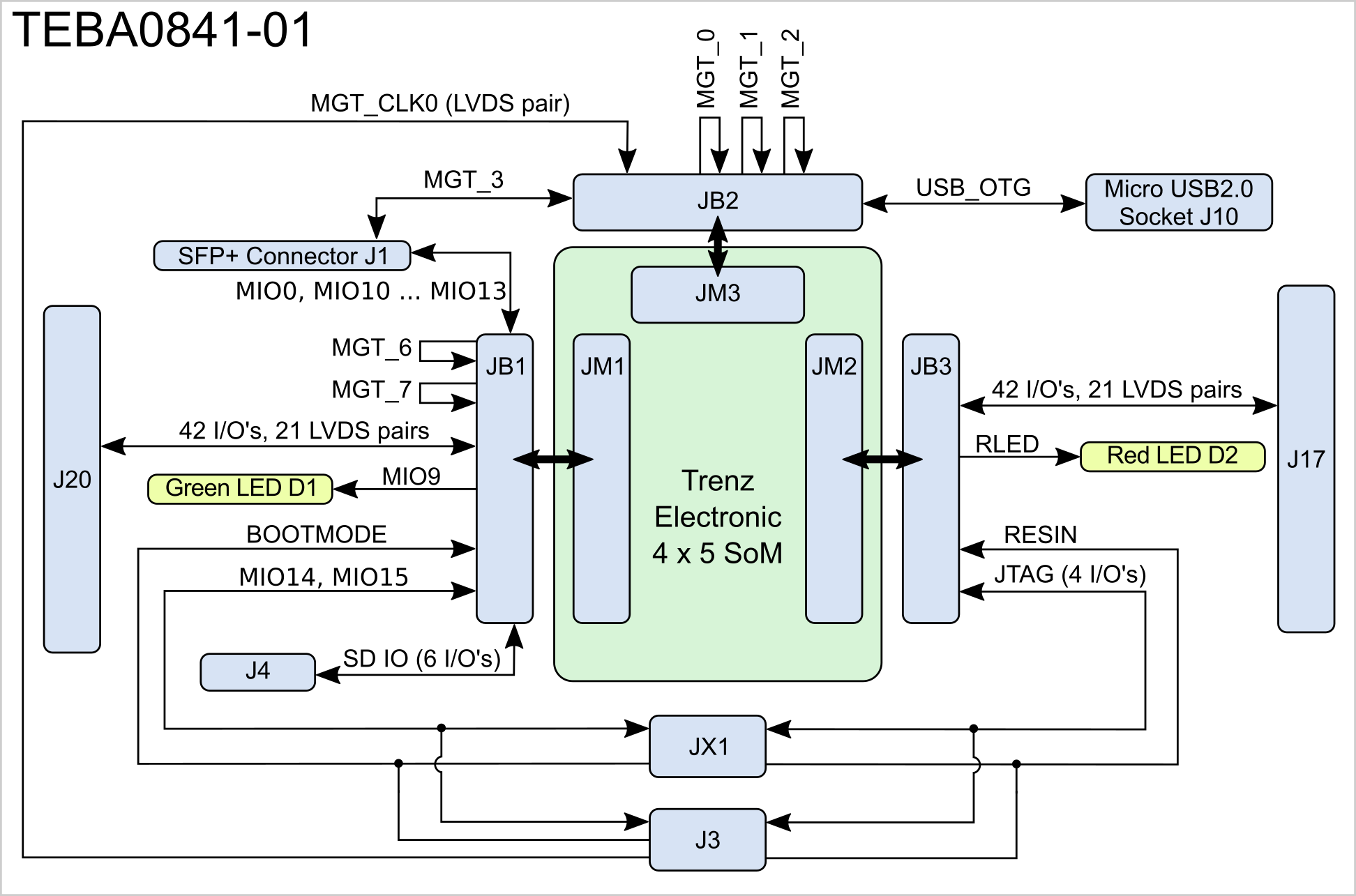
Figure 1: TEBA0841-01 Block Diagram
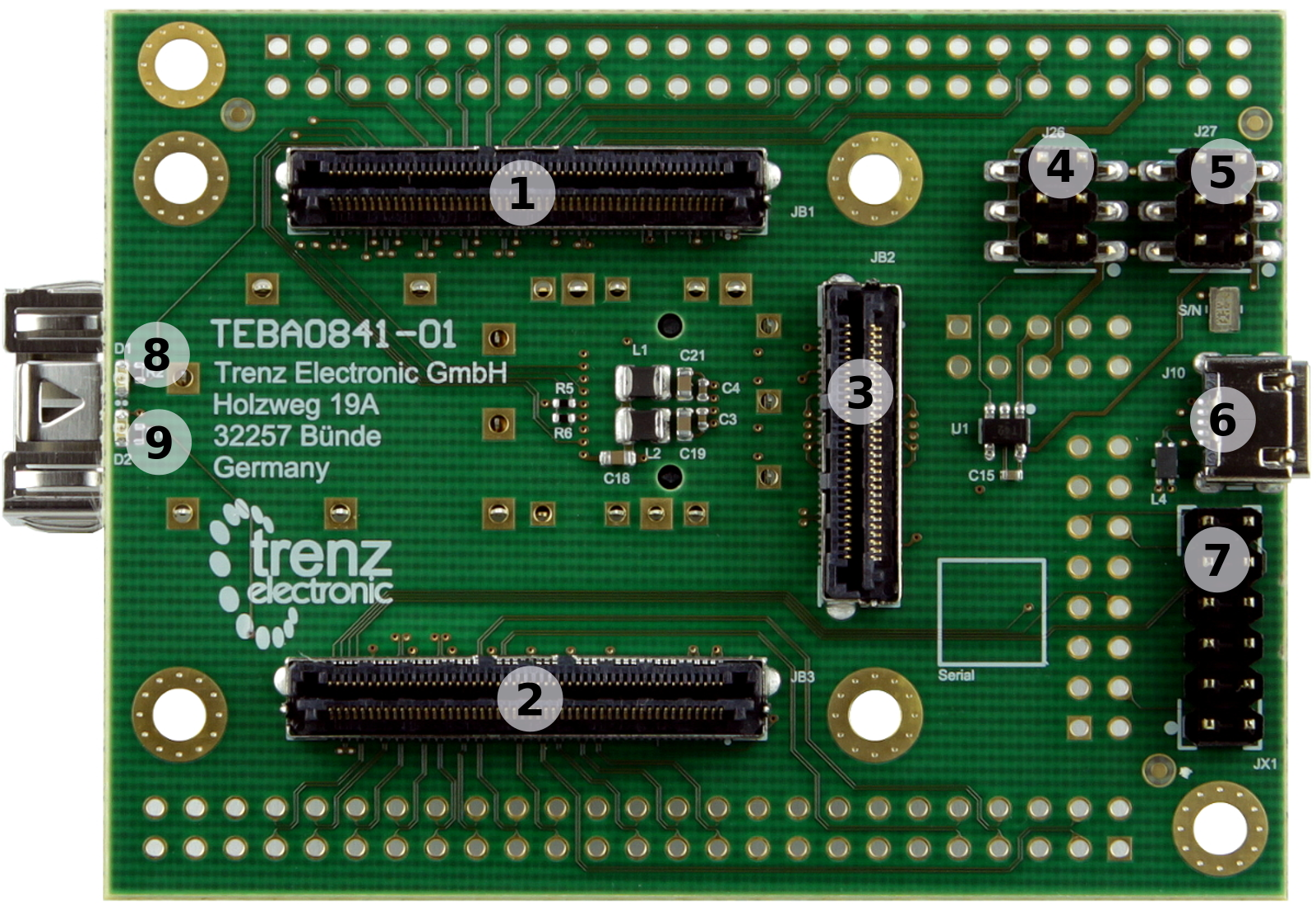
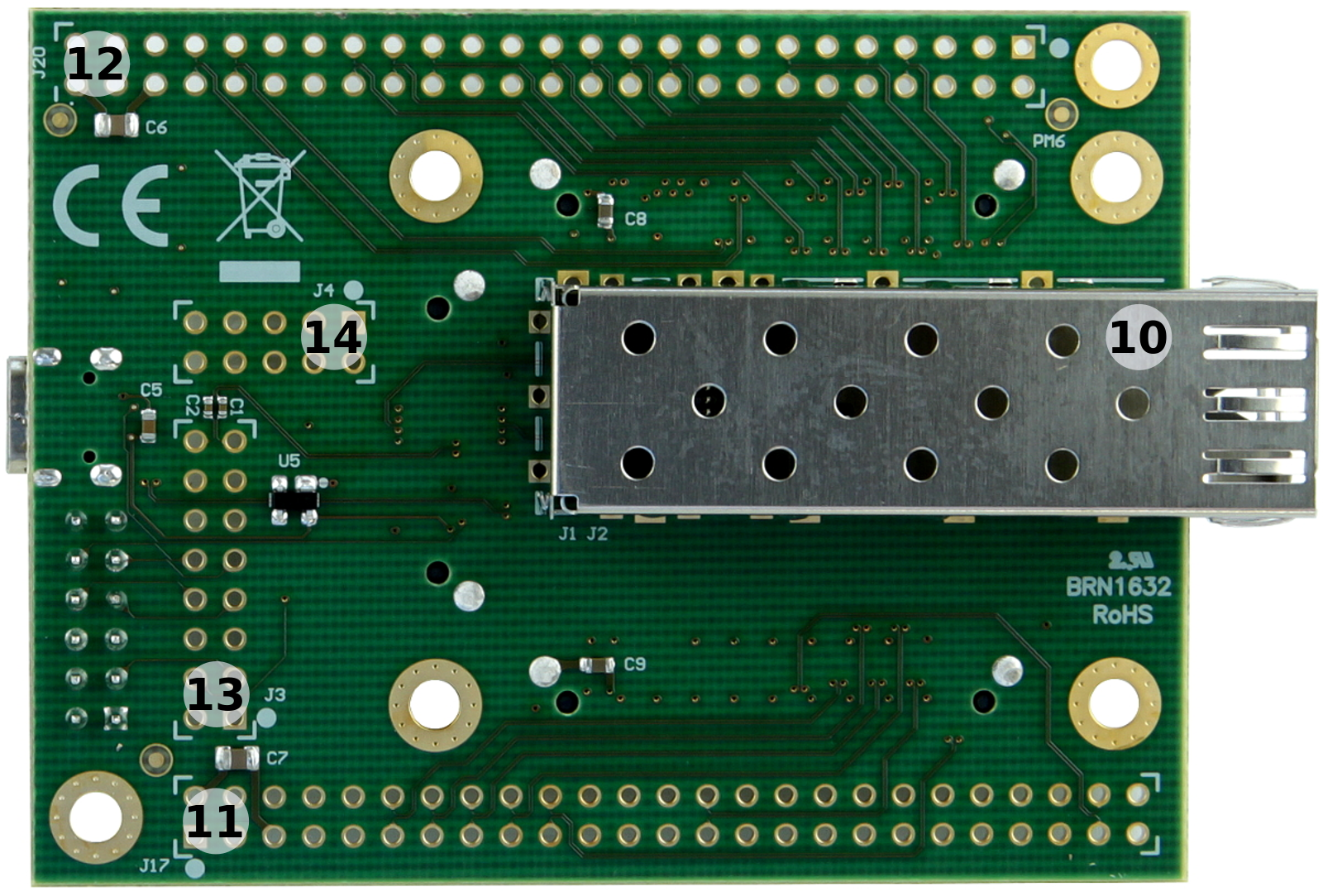
Figure 2: 4x5 SoM carrier board TEBA0841-01
TEBA0841-01:
On the TEBA0841 Carrier Board is a SFP+ connector J1 (board-rev. 01: Molex 74441-0001). The connector is embedded into a SFP cage J2 (board-rev. 01: Molex 74737-0009).
The RX-/TX-data-lanes are connected to B2B-connector JB2, the control-lines are connected to module's IO-pins on B2B-connector JB1 (MIO0-bank-pins in standard TE module's pin-assignment).
On this SFP+ connector, on both 4 x 5 SoMs TE0741 and TE0841 MGT-lane 3 is accessible.
The pin-assignment of the SFP connector is in detail as fellows:
| SFP+ pin | SFP+ pin netname | B2B | Note |
|---|---|---|---|
| Transmit Data + (pin 18) | MGT_TX3_P | JB2-26 | - |
| Transmit Data - (pin 19) | MGT_TX3_N | JB2-28 | - |
| Receive Data + (pin 13) | MGT_RX3_P | JB2-25 | - |
| Receive Data - (pin 12) | MGT_RX3_N | JB2-27 | - |
| Receive Fault (pin 2) | MIO10 | JB1-96 | - |
| Receive disable (pin 3) | not connected | - | - |
| MOD-DEF2 (pin 4) | MIO13 | JB1-98 | 3.3V pull-up, (usuable as SDA, I²C-Master) |
| MOD-DEF1 (pin 5) | MIO12 | JB1-100 | 3.3V pull-up, (usuable as SCL, I²C-Master) |
| MOD-DEF0 (pin 6) | MIO11 | JB1-94 | - |
| RS0 (pin 7) | not connected | - | - |
| LOS (pin 8) | MIO0 | JB1-88 | - |
| RS1 (pin 9) | not connected | - | - |
Table 1: SFP+ connector pin-assignment
The TEBA0841 Carrier Board is mainly for the 4 x 5 SoMs TE0841 and TE0741. This SoMs have GTX-Transceiver units on their FPGA-modules with up to 8 available MGT-lanes. To test this MGT-lanes, the 5 RX/TX differential pairs are bridged on-board, hence the transmitted data on this MGT-lanes are received simultaneously by the same MGT-lane in a loop-back circuit..
The MGT-lane pins are bridged on-board as fellows, if 4 x 5 SoM TE0741 is mounted:
| MGT-lane | B2B TX diff-pair | B2B RX diff-pair | B2B-pins bridged |
|---|---|---|---|
| MGT-lane 0 | JB2-8 (MGT_TX0_N) JB2-10 (MGT_TX0_P) | JB2-7 (MGT_RX0_N) JB2-9 (MGT_RX0_P) | JB2-7 to JB2-8 JB2-9 to JB2-10 |
| MGT-lane 1 | JB2-14 (MGT_TX1_N) JB2-16 (MGT_TX1_P) | JB2-13 (MGT_RX1_N) JB2-15 (MGT_RX1_P) | JB2-13 to JB2-14 JB2-15 to JB2-16 |
| MGT-lane 2 | JB2-20 (MGT_TX2_N) JB2-22 (MGT_TX2_P) | JB2-19 (MGT_RX2_N) JB2-21 (MGT_RX2_P) | JB2-19 to JB2-20 JB2-21 to JB2-22 |
| MGT-lane 7 | JB1-3 (MGT_TX7_P) JB1-5 (MGT_TX7_N) | JB1-9 (MGT_RX7_P) JB1-11 (MGT_RX7_N) | JB1-3 to JB1-9 JB1-5 to JB1-11 |
| MGT-lane 6 | JB1-15 (MGT_TX6_P) JB1-17 (MGT_TX6_N) | JB1-21 (MGT_RX6_P) JB1-23 (MGT_RX6_N) | JB1-15 to JB1-21 JB1-17 to JB1-23 |
Table 2: Bridging-table of the MGT-lanes for mounted 4 x 5 SoM TE0741.
| Note: The MGT-lanes of the 4 x 5 SoM TE0841 have different designations. See Schematic of the particular module. |
The TEBA0841 carrier board has one physical USB-connector J10, which is available as Micro-USB port. The USB interface J10 can be operated in Device- and OTG-modes. The Micro-USB port-pins are routed to the USB-OTG-interface on B2B-connector JB2. There are usually corresponding USB-PHYs on SoMs supported by the Carrier Board TEBA0841.
The JTAG-interface of the mounted 4 x 5 SoM can be accessed via header JX1. This header has a 'XMOD FTDI JTAG Adapter'-compatible pin-assignment.
| JX1 pin | JX1 pin net-name | B2B |
|---|---|---|
| C (pin 4) | TCK | JB3-100 |
| D (pin 8) | TDO | JB3-98 |
| F (pin 10) | TDI | JB3-96 |
| H (pin 12) | TMS | JB3-94 |
| A (pin 3) | MIO15 | JB1-86 (usable as UART-RX/TX) |
| B (pin 7) | MIO14 | JB1-91 (usable as UART-RX/TX) |
| E (pin 9) | BOOTMODE | JB1-90 (JTAGSELECT) |
| G (pin 11) | RESIN | JB3-17 |
Table 3: JTAG header JX1 pin-assignment
There is also the option to mount and solder a 2-row 16-pin header to the place-holder J3, which has the same pin-assignment as header JX1, but with also two additional pins (15,16) as LVDS-pair, to put an external reference clock-signal to the mounted 4 x 5 SoM. The clock-signal is put to to the SoM via B2B-connector pins JB2-32 (MGT_CLK0_N, J3-16) and JB2-34 (MGT_CLK0_P, J3-15).
On both interfaces (JX1, J3), the pins with the net-names MIO14 and MIO15 are available as user IO's which could be used as UART-interface for example.
There are two LEDs D1 (green) and D2 (red) available to the user. The green LED D1 is connected to the pin JB1-92 with the net-name 'MIO9', the red LED D2 is connected to the pin JB3-90 with the net-name 'RLED'.
The place-holder J4 with solder-pads to mount a 2-row 10-pin header provides the capability, to access via this header the SDIO-port of the mounted 4 x 5 SoM, if available. For this purpose, there is also voltage-translation via SDIO port expander (e.g. Texas Instruments TXS02612) necessary due to the different voltage levels of the Micro SD Card (3.3V) and MIO0-bank of the Xilinx Zynq-chip (1.8V).
In other cases this can be used to access PL IO-bank-pins of the SoM.
The place-holders J17 and J20 with solder-pads to mount 2-row 50-pin headers provide the capability to access the PL IO-bank pins of the mounted 4 x 5 SoM.
With mounted header J17 there are 42 IO's of PL-IO-bank 13 of the 4 x 5 SoM available (B2B-connector JB3), which are also usable as 21 LVDS-pairs. On this header the IO's are operable with fixed (3.3V) or selectable VCCIO-voltage VCCIOD.
On header J20 there are 42 IO's available of PL-IO-bank 35 (B2B-connector JB1). This IO's are also usable as 21 LVDS-pairs and operable with fixed (3.3V) or selectable VCCIO-voltage VCCIOA.
Power supply with minimum current capability of 3A at 3.3V for system startup is recommended.
The on-board voltages of the carrier board will be powered up with an external power-supply with nominal voltage of 3.3V.
The external power-supply can be connected to the board by the following pins:
| Connector | 3.3V pin | GND pin |
|---|---|---|
| JX1 | JX1-5, JX1-6, | JX1-1, JX1-2 |
| J3 | J3-5, J3-6 | J3-1, J3-2 |
| J4 | J4-5 | J4-1, J4-2 |
| J20 | J20-5, J20-46 | J20-1 , J20-2 , J20-49 , J20-50 |
| J17 | J17-5, J17-46 | J17-1 , J17-2 , J17-49 , J17-50 |
Table 4: Connector-pins capable for external 3.3V power-supply
The PL IO-bank supply-voltages 1.8V, 2.5V and 3.3V will be available after the mounted module's 3.3V voltage level is present on B2B connector JM2 pins 10 and 12, meaning that all on-module voltages have become stable and module is properly powered up.
Note: The supply-voltages have low current dropout.

Figure 3: Power-On sequence diagram
On the TEBA0841 carrier board different VCCIO configurations can be chosen by the jumper J26 and J27.
The purpose of the jumper of the Carrier Board will be explained in the following sections.
On the TEBA0841 carrier board the PL IO-bank's supply voltages of the 4x5 SoM (VCCIOA, VCCIOD; see 4x5 Module Integration Guide) are connected to the base-board VCCIO-voltage VCCIOA and VCCIOD, which are selectable between the supply-voltages 1.8V, 2.5V and 3.3V via jumper J26 and J27.
baseboard supply-voltages | base-board B2B connector-pins | standard assignment of PL IO-bank supply-voltages on TE 4x5 module's B2B connectors-pins |
|---|---|---|
| VCCIOA | JB1-10, JB1-12 | VCCIOA (JM1-9, JM1-11) |
| VCCIOD | JB2-8, JB2-10 | VCCIOD (JM2-7, JM2-9) |
Table 5: base-board supply-voltages VCCIOA and VCCIOD
Note: The corresponding PL IO-voltage supply voltages of the 4x5 SoM to the selectable base-board voltage VCCIOA and VCCIOD are depending on the mounted 4x5 SoM and varying in order of the used model. Refer to SoM's schematic to get information about the specific pin-assignment on module's B2B-connectors regarding PL IO-bank supply-voltages and to the 4x5 Module integration Guide for VCCIO voltage options. |
Following table describes how to configure the base-board supply-voltages by jumpers:
base-board supply-voltages vs voltage-levels | VCCIOA | VCCIOD |
|---|---|---|
| 1.8V | J26: 1-2 | J27: 1-2 |
| 2.5V | J26: 3-4 | J27: 3-4 |
| 3.3V | J26: 5-6 | J27: 5-6 |
Table 6: Configuration of base-board supply-voltages via jumpers. Jumper-Notification: 'Jx: 1-2' means pins 1 and 2 are connected, 'Jx: 3-4' means pins 3 and 4 are connected, and so on.
| It is recommended to set and measure the PL IO-bank supply-voltages before mounting of TE 4x5 module to avoid failures and damages to the functionality of the mounted SoM. |
| Parameter | Min | Max | Units | Notes |
|---|---|---|---|---|
Vin supply voltage | 3.135 | 3.465 | V | 3.3V supply-voltage ± 5% |
Storage Temperature | -55 | 105 | °C | Molex 74441-0001 Product Specification |
| Parameter | Min | Max | Units | Notes |
|---|---|---|---|---|
| Vin supply voltage | 3.135 | 3.465 | V | - |
Board size: PCB 56.47 mm × 75 mm. Notice that some parts the are hanging slightly over the edge of the PCB like the mini USB-jacks and the SFP+ connector, which determine the total physical dimensions of the carrier board. Please download the assembly diagram for exact numbers.
Mating height of the module with standard connectors: 8mm
PCB thickness: ca. 1.65mm
Highest part on the PCB is the SFP+ connector, which has an approximately 11.3 mm overall hight. Please download the step model for exact numbers.
The dimensions are given in mm and mil (milli inch).
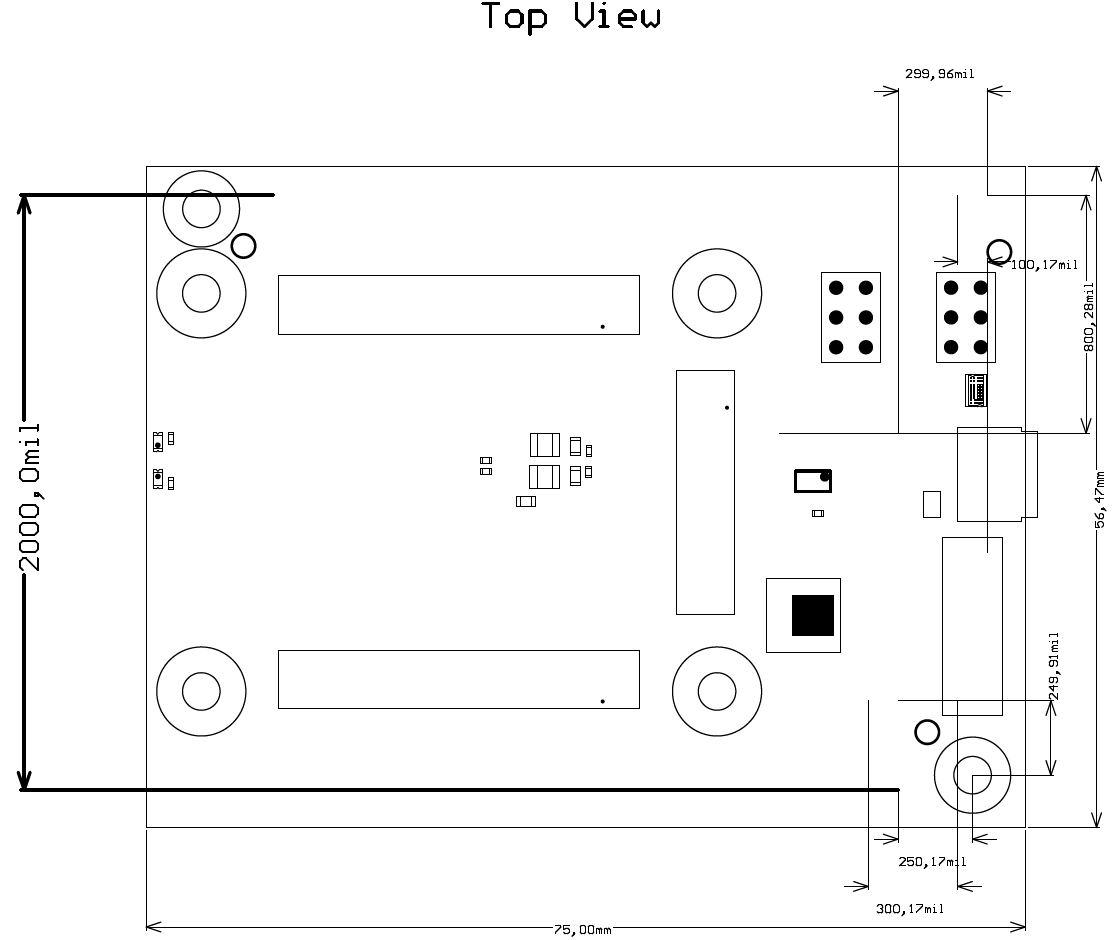
Figure 4: Physical Dimensions of the TEBA0841-01 carrier board
Commercial grade: 0°C to +70°C.
Board operating temperature range depends also on customer design and cooling solution. Please contact us for options.
ca. 32 g - Plain board
| date | revision | authors | description |
|---|---|---|---|
| 2017-02-08 | Ali Naseri | current TRM for TEBA0841-01 | |
| 2017-01-30 | 0.1 | Ali Naseri | Initial document |
| Date | Revision | Notes | PCN | Documentation link |
|---|---|---|---|---|
| - | 01 |
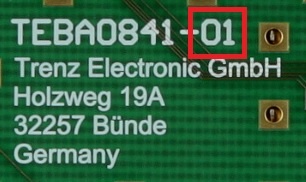
Figure 5: Hardware revision Number
Hardware revision number is printed on the PCB board next to the model number separated by the dash.